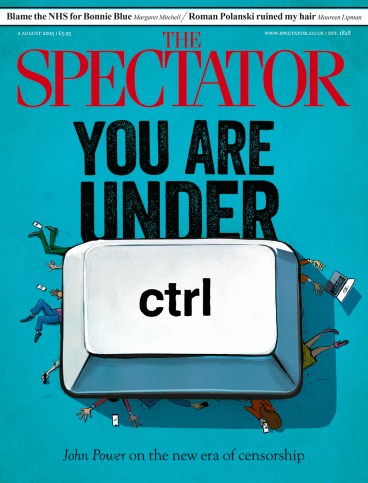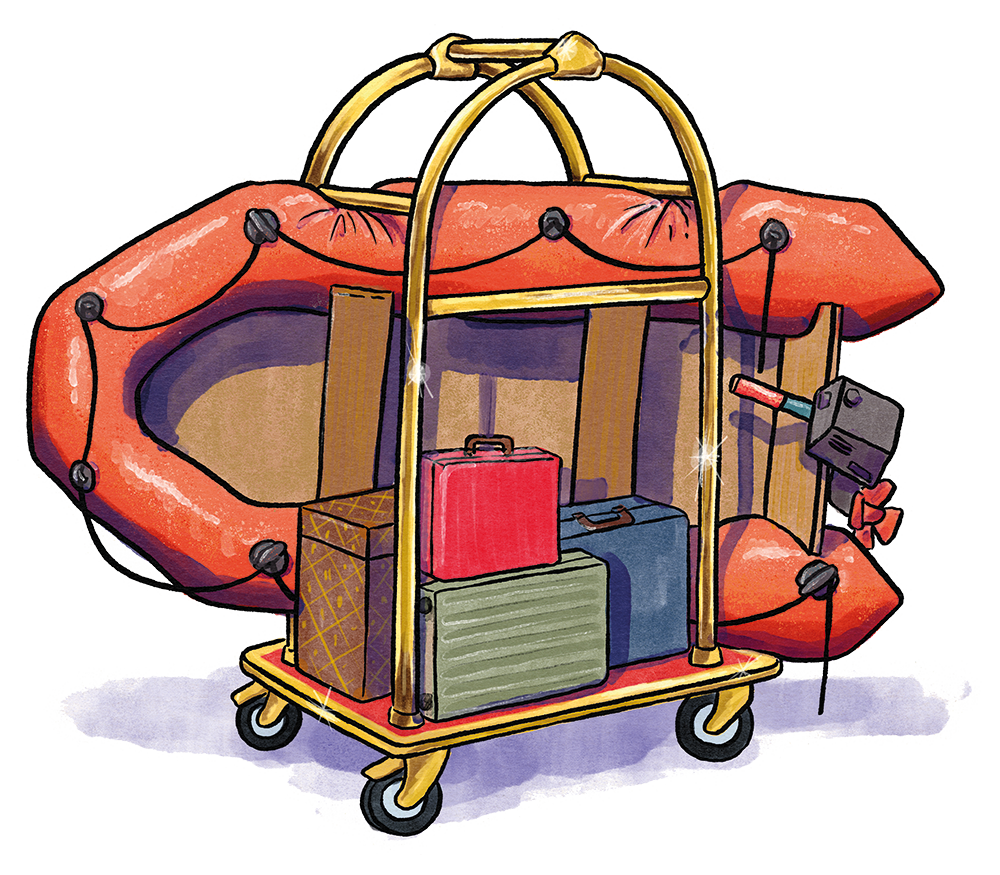
Yvette Cooper doesn’t do holidays, which is probably just as well since she is the minister who, this summer, holds Labour’s fate in her hands. During the Easter break, the Home Secretary, her husband Ed Balls and their adult children holidayed in Madrid. Cooper went every day to the British embassy to check emails and make secure phone calls to London.
Balls tells a story about a camper van trip to New England in 2015, when Cooper was running for the Labour leadership. ‘After a few early mornings spent sailing her into the middle of the lake near their campsite so she had enough signal to call her campaign team in London, he sent her home,’ a family friend recalls. ‘As much as any politician since Gordon Brown, she treats time off as something to be endured to keep her family happy, rather than something to be enjoyed.’
For every £100 Trump has splurged on immigration enforcement, Reeves is spending 20p
Cooper now needs to deploy Gordon Brown’s clunking fist if she is to get to grips with the unrest on Britain’s streets over illegal immigrants housed in ‘asylum hotels’. Small boat arrivals so far this year exceed 24,000, a 50 per cent rise on last year. This is a disaster for Labour for three reasons. First, each new arrival adds to the pressure on public services and the asylum system. Then there’s the fact that the boats highlight government failure, further diminishing public trust in the political class. Finally, migration is cripplingly expensive.
Some 110,000 asylum seekers are awaiting a decision while the government pays £5.8 million a day to house 32,000 of them in 210 hotels – down just two since the election, despite a manifesto pledge to ‘end asylum hotels’. In 2024-25 the hotel bill was £2.1 billion, down from £3 billion in 2023-24. The average nightly bill also fell to £119 in March this year from £162 in March 2023. Voters view these sums as grotesque. While 35,000 failed asylum seekers, foreign criminals and other immigration offenders have been returned or deported since the election, most of these were not small boat arrivals.
The hoteliers are making a killing. Clearsprings, Serco and Mears made profits of £380 million over the past five years. The Home Office has ended a contract with Stay Belvedere hotels, which provided more than 50 sites, but other contracts (which run until 2029) mean efforts to move migrants to cheaper hotels are legally impossible. Cooper is trying instead to trigger clauses on excess profits to claw back cash.
Lawyers are also cashing in. Between March and December last year alone, some 45,787 legal aid claims were granted at an average cost of £827 per case.
Many MPs gaze enviously at Donald Trump’s approach. On his first day in office he declared a ‘national emergency’ and sent 7,000 troops to the border with Mexico. This year 300,000 undocumented immigrants have been arrested by America’s Immigration and Customs Enforcement agency (ICE), with 139,000 deported by April. Up to 3,000 are now incarcerated in cages at an abandoned airport in the Florida Everglades, dubbed ‘Alligator Alcatraz’.
Crossings from Mexico, meanwhile, fell to 7,000 in March, compared with 137,000 in March last year. It’s easy to see why, on his visit to Turnberry this week, Trump said of Keir Starmer and Nigel Farage: ‘The one that’s toughest and most competent on immigration is going to win the election.’
But it is not as simple as aping Trump’s toughness. The President’s ‘Big Beautiful Bill’ earmarked $170 billion for immigration enforcement over the next four years, including $75 billion for ICE. Contrast that with Rachel Reeves’s public spending review, when the headline on immigration was an extra £280 million a year by 2028‑29 for the Border Security Command. For every £100 Trump has splurged, the Chancellor is spending 20p. And border security was one of the few ‘winners’. Cooper and Home Office Permanent Secretary Antonia Romeo face cutting resources for immigration enforcement teams who process removals and increase the speed of decisions.
In Whitehall, the blame is directed at Darren Jones, the chief secretary to the Treasury, and Conrad Smewing, the Treasury’s director general of public spending. After one meeting where London Mayor Sadiq Khan and Met commissioner Mark Rowley warned of policing pressures, Jones told officials: ‘The problem with the police is they always want shiny new walkie-talkies.’
The Home Office argued that for every additional 100 caseworkers, 1,400 extra foreign criminals per year would be processed and sent back. Smewing said: ‘Only an imbecile would believe any of that.’
The Chancellor and Prime Minister were preoccupied with trying to find cash for the U-turns on winter fuel and disability benefits cuts. By the time they got involved, they were warned that helping Cooper would mean unpicking the whole spending review. ‘Reeves sided with Jones and Starmer refused to interfere,’ an official said.
There were even more heated clashes over Cooper’s immigration white paper which tightened the rules around work and student visas. The Treasury quoted models by the Office for Budget Responsibility (OBR), which say migration boosts growth. ‘Every last one of them, from Rachel down, is obsessed with the OBR forecasts,’ says an aide. The result is that some of those who overstay their visas end up in migrant hotels, a clear economic cost rather than a gain.
With Reform and the Tories hammering Labour on immigration and its links with crime, and ministers openly talking about a summer of social unrest, this parsimony looks like a false economy and an even worse political mistake than Reeves’s decision to slash winter fuel payments. Cooper, by contrast, has been radicalised in the Home Office. When Kurdish parents in France argued they should be able to come to Britain to be with their children, aged five and nine, who had crossed the Channel in a small boat, Cooper defied human rights campaigners, telling officials: ‘I’m not creating a precedent where someone can abandon their kids on a boat and join them on the Eurostar a week later.’ France took the children back.
Insiders say there is ‘no squeamishness’ in government about tough measures and Starmer has a ‘high risk appetite’ to legal challenge. Some suggest even Lord Hermer, the Attorney General, has been a ‘problem solver’ in trying to plot a path through the legal weeds. But all radical solutions are expensive. Rupert Lowe, the ex-Reform MP, costed his plan for mass detention and deportation at £47.5 billion over five years.
Negotiations continue to create ‘return hubs’ and deals with other countries. But more radical proposals risk blowback. Closing the hotels would, according to government estimates, increase homelessness from 4,600 rough sleepers to more than 30,000.
Using the Royal Navy to force the boats back to France, as some on the right have urged, risks an end to limited co-operation by the French. On the day in May when more than 1,100 migrants crossed the Channel, several French units were withdrawn from the coast to deal with rioting in Paris after the Champions League final. Cooper’s team hopes a recent pilot deal with France will ‘imminently’ show that migrants can be returned. While images of French police slashing an inflatable trafficker ‘taxi boat’ were popular in the UK, they sparked fury in the French media.
The solution may have to be legal. Work is under way on legislation to make it harder for the courts to use Article 8 of the European Convention on Human Rights (ECHR), the ‘right to a family life’, to keep people in the UK.
But Labour is being outflanked. Kemi Badenoch is expected to outline how the Tories would leave the ECHR at their party conference in October. A Reform source, reflecting on how the middle ground on immigration is racing to the right, said: ‘The Overton window is on rails. It wouldn’t surprise me if Labour go into the next election promising to deport hundreds of thousands of illegal immigrants.’
Even Labour figures close to No. 10 think Starmer will have to challenge the Strasbourg court to change or leave the convention – something Hermer violently opposes. A loyalist MP says: ‘Unless Keir stands up and says: “I’m Mr Human Rights and even I think this doesn’t work any more”, then I don’t see how we win the next election.’
If he wants to avoid that scenario, Starmer needs to give Cooper more resources, or both of them will have time for a much longer summer holiday in 2029.









Comments